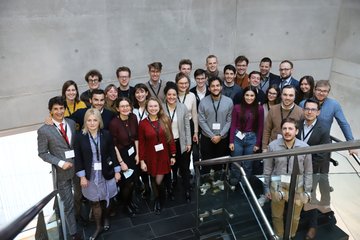
Gender and Private International Law (GaP)
Auftaktveranstaltung / Conference Report
- Datum: 25.10.2019
- Uhrzeit: 14:00 - 17:00
What is the relationship between Private International Law (PIL) & Gender?
Private International Law and Gender Studies deal with the same real life situations, and yet they rarely talk to each other. Ivana Isailović and Ralf Michaels set out to change this.
Think for instance of the issue of transnational surrogacy. In a typical case, couples living in states where surrogacy is prohibited will travel to a state that allows it, and will enter into a surrogacy agreement with the surrogate, who will bear the child for them. Once the child is born, the intended parents come back to the state of their domicile.
Such a situation creates questions for private international law. PIL is asked to answer which law to apply to intricate questions: whether the parent-child relationship is valid in the home State of the intended parents, whether the contract with the surrogate is enforceable, and so on.
Surrogacy creates seemingly different debates for the field of gender studies. For some feminist and gender scholars, surrogacy commodifies women’s bodies and constitutes oppression for women of colour. For others however, banning surrogacy denies surrogate’s agency, given that under certain circumstances surrogacy could be a rational economic choice for the surrogate.
Rarely are these two strands of scholarship studied together, but doing so should yield great benefits. With this in mind , the co-leaders of the Gender & PIL project — Ralf Michaels (Director, MPI Hamburg) & Ivana Isailović (Fellow MPI, Northeastern University) — aim to create a platform for transdisciplinary discussions and research, where scholars from both PIL and gender studies engage in cross-teaching and learn from one another. What is the relationship between Private International Law (PIL) & Gender? The workshop started with Ivana Isailović giving an overview of the notion of gender, the rise of various–and sometimes incompatible – feminist and gender theories, and how they are translated into law. Participants then shared their thoughts on how gender appears in their own work.
The kick-off event of the project took place on October 25th at the MPI, and was convened by Ivana Isailović & Roxana Banu (Western, Queen’s Mary) whose research sits at the intersection between PIL, and feminist and gender approaches.
The event was organized as a discussion session around short excerpts selected from PIL and gender studies scholarship. It focused on three topics: the diversity of gender approaches, the relation between PIL and gender studies, and the challenges to deploying the interdisciplinary analysis.
Ralf Michaels welcomed the participants and stressed the importance of opening a discussion about the interaction between PIL and gender studies, and of providing a transdisciplinary forum that fosters mutual learning between the disciplines.
Roxana Banu continued by giving an overview of the relevance of PIL methodology for addressing questions feminist and gender studies scholars have identified, most notably the conflicts between ‘gender equality’ and ‘culture’.
The workshop proceeded with a group discussion on the regulation of transnational surrogacy and how gender approaches can provide insights into PIL debates.
Finally, participants shared their views on what the main challenges of studying the two fields together, and discussed about the next steps of the project.
More than forty scholars from different countries (Germany, Austria, France, Italy, South Africa, etc.), and from various disciplines, including private international law, private law, gender and socio-legal studies, attended the launch.
We thank all the participants for coming to MPI and for sharing their scholarship! More transdisciplinary events are scheduled in the future, including reading groups, a full-day workshop in spring 2020, and a conference.
For more information about the project, write to us at gender@mpipriv.de.











